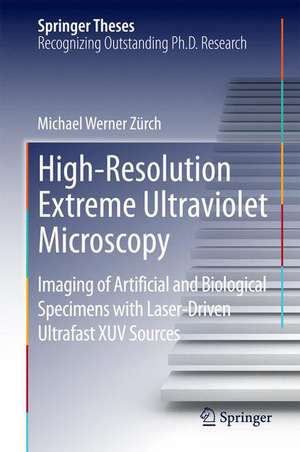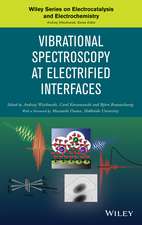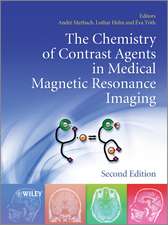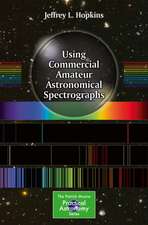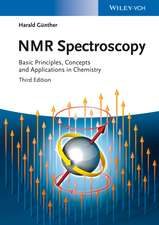High-Resolution Extreme Ultraviolet Microscopy: Imaging of Artificial and Biological Specimens with Laser-Driven Ultrafast XUV Sources: Springer Theses
Autor Michael Werner Zürchen Limba Engleză Hardback – 21 noi 2014
| Toate formatele și edițiile | Preț | Express |
|---|---|---|
| Paperback (1) | 633.19 lei 6-8 săpt. | |
| Springer International Publishing – 11 sep 2016 | 633.19 lei 6-8 săpt. | |
| Hardback (1) | 639.25 lei 6-8 săpt. | |
| Springer International Publishing – 21 noi 2014 | 639.25 lei 6-8 săpt. |
Din seria Springer Theses
- 18%
 Preț: 997.88 lei
Preț: 997.88 lei -
 Preț: 389.88 lei
Preț: 389.88 lei - 15%
 Preț: 646.94 lei
Preț: 646.94 lei - 18%
 Preț: 943.43 lei
Preț: 943.43 lei -
 Preț: 399.29 lei
Preț: 399.29 lei - 18%
 Preț: 944.99 lei
Preț: 944.99 lei - 15%
 Preț: 636.80 lei
Preț: 636.80 lei - 18%
 Preț: 941.05 lei
Preț: 941.05 lei - 15%
 Preț: 643.16 lei
Preț: 643.16 lei - 15%
 Preț: 642.68 lei
Preț: 642.68 lei - 18%
 Preț: 1103.62 lei
Preț: 1103.62 lei - 20%
 Preț: 558.82 lei
Preț: 558.82 lei - 18%
 Preț: 1112.30 lei
Preț: 1112.30 lei - 18%
 Preț: 944.19 lei
Preț: 944.19 lei - 18%
 Preț: 1109.92 lei
Preț: 1109.92 lei - 18%
 Preț: 1217.27 lei
Preț: 1217.27 lei - 15%
 Preț: 640.06 lei
Preț: 640.06 lei - 15%
 Preț: 636.45 lei
Preț: 636.45 lei - 15%
 Preț: 640.06 lei
Preț: 640.06 lei - 15%
 Preț: 640.88 lei
Preț: 640.88 lei -
 Preț: 389.70 lei
Preț: 389.70 lei - 20%
 Preț: 563.89 lei
Preț: 563.89 lei -
 Preț: 393.35 lei
Preț: 393.35 lei - 15%
 Preț: 637.93 lei
Preț: 637.93 lei - 15%
 Preț: 641.85 lei
Preț: 641.85 lei - 18%
 Preț: 1225.94 lei
Preț: 1225.94 lei - 20%
 Preț: 551.36 lei
Preț: 551.36 lei - 18%
 Preț: 1229.10 lei
Preț: 1229.10 lei - 15%
 Preț: 639.25 lei
Preț: 639.25 lei - 18%
 Preț: 999.45 lei
Preț: 999.45 lei - 15%
 Preț: 640.06 lei
Preț: 640.06 lei - 18%
 Preț: 1220.45 lei
Preț: 1220.45 lei - 18%
 Preț: 1116.26 lei
Preț: 1116.26 lei - 18%
 Preț: 1110.72 lei
Preț: 1110.72 lei - 18%
 Preț: 1000.87 lei
Preț: 1000.87 lei - 18%
 Preț: 891.17 lei
Preț: 891.17 lei - 15%
 Preț: 640.06 lei
Preț: 640.06 lei - 5%
 Preț: 1154.07 lei
Preț: 1154.07 lei - 15%
 Preț: 635.96 lei
Preț: 635.96 lei - 15%
 Preț: 640.88 lei
Preț: 640.88 lei -
 Preț: 387.20 lei
Preț: 387.20 lei - 18%
 Preț: 1109.92 lei
Preț: 1109.92 lei -
 Preț: 385.25 lei
Preț: 385.25 lei -
 Preț: 385.25 lei
Preț: 385.25 lei - 18%
 Preț: 1112.30 lei
Preț: 1112.30 lei - 18%
 Preț: 999.45 lei
Preț: 999.45 lei -
 Preț: 386.99 lei
Preț: 386.99 lei - 15%
 Preț: 637.13 lei
Preț: 637.13 lei - 20%
 Preț: 554.20 lei
Preț: 554.20 lei - 20%
 Preț: 555.57 lei
Preț: 555.57 lei
Preț: 639.25 lei
Preț vechi: 752.06 lei
-15% Nou
Puncte Express: 959
Preț estimativ în valută:
122.32€ • 128.05$ • 101.21£
122.32€ • 128.05$ • 101.21£
Carte tipărită la comandă
Livrare economică 05-19 aprilie
Preluare comenzi: 021 569.72.76
Specificații
ISBN-13: 9783319123875
ISBN-10: 3319123874
Pagini: 127
Ilustrații: XVIII, 127 p. 44 illus., 30 illus. in color.
Dimensiuni: 155 x 235 x 15 mm
Greutate: 0.39 kg
Ediția:2015
Editura: Springer International Publishing
Colecția Springer
Seria Springer Theses
Locul publicării:Cham, Switzerland
ISBN-10: 3319123874
Pagini: 127
Ilustrații: XVIII, 127 p. 44 illus., 30 illus. in color.
Dimensiuni: 155 x 235 x 15 mm
Greutate: 0.39 kg
Ediția:2015
Editura: Springer International Publishing
Colecția Springer
Seria Springer Theses
Locul publicării:Cham, Switzerland
Public țintă
ResearchCuprins
Foreword.- Abstract.- Preamble.- Introduction and Fundamental Theory.- Experimental Setup.- Lensless Imaging Results.- Optical Vortices in the XUV.- Summary and Outlook.- Appendices.
Notă biografică
Michael Zürch finished his diploma thesis in 2010 on optical induced damage in nanostructures at the Friedrich-Schiller-University Jena earning him the best diploma thesis award of the faculty. During his doctorate he contributed to eight peer-reviewed journal articles, first-authoring five of them. Furthermore, he contributed to two patents and more than a dozen conference presentations, winning an award at the SPIE Medical Imaging 2014 conference for his cancer cell classification research. He finished his PhD thesis in 2014 at the Institute of Optics and Quantum Electronics at FSU Jena on the generation of coherent laser-like extreme ultraviolet light and its application to high-resolution imaging.
Textul de pe ultima copertă
This book provides a comprehensive overview of the technique of frequency conversion of ultrafast lasers towards the extreme ultraviolet (XUV) regime, starting with the frequency conversion scheme and its technical implementation as well as general considerations of diffraction-based imaging at nanoscopic spatial resolutions. The last few centuries have seen continual advances in optical microscopy, driven by the demand to image ever-smaller objects. In recent years, frequency conversion of ultrafast lasers towards the extreme ultraviolet (XUV) regime has significantly enhanced the achievable resolution thanks to shorter wavelengths. The absence of high-magnification optics in the XUV regime is a major issue associated with this technique and is tackled with direct measurement and reconstruction of coherent diffraction patterns. The experimental application of this technique in terms of digital in-line holography and coherent-diffraction imaging is demonstrated on artificial and biological specimens. The book introduces a novel, award-winning cancer-cell classification scheme based on biological imaging. Finally, it presents a newly developed technique for generating structured illumination in the XUV regime and demonstrates its usability for super-resolution imaging.
Caracteristici
Nominated as an outstanding Ph.D. thesis by the Friedrich-Schiller University Jena, Germany Includes a comprehensive overview of diffraction-based imaging theory Demonstrates a novel award-winning technology for breast cancer cell classification Presents the first experimental realization of frequency upconversion of optical vortex beams carrying orbital angular momentum Includes supplementary material: sn.pub/extras
